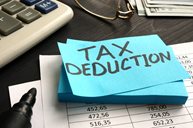The Australian Tax Office assigns a unique tax file number to every person who works or receives benefits in Australia. To apply for a tax file number (or to find out your number) you need to contact the Australian Taxation Office.
Tax Returns in Australia
Managing your tax obligations in Australia is essential. If you earn income in the country, you must obtain a tax file number (TFN) and pay taxes on your earnings. Your yearly tax liability is determined through the annual tax return process.
For employees, income tax is automatically deducted by employers during the financial year, which spans from July 1 to June 30. Self-employed individuals are responsible for making periodic income tax payments. At the end of each financial year, you must submit a tax return.
Your tax return will calculate the precise tax amount owed for the year, accounting for deductions, offsets, and rebates. If the amount already paid is incorrect, you'll either owe additional taxes or be eligible for a tax refund.
For information on ways to lodge your tax return with H&R Block, see our Tax Returns page.
Understanding Tax Returns in Australia
Australia employs a progressive tax system, meaning the more you earn, the higher your tax liability. The Australian Taxation Office (ATO) manages tax collection on behalf of the government.
Your income tax payment depends on your taxable income and encompasses all income types, such as wages, business profits, and investment returns, like interest earned from your bank account.
This means that you need to declare various types of income when lodging your tax return. These include:
- Employment income (such as salary and wages, allowances, bonuses, tips, fringe benefits, lump sum payments and super contributions)
- Centrelink and other government payments (such as the age pension, Austudy, Abstudy, Jobseeker, youth allowance,carer payments and parenting payment)
- Investment income (such as interest, dividends, rental income or other capital gains)
- Superannuation pensions and annuities
- Business, partnership and trust income
- Compensation and insurance payments
- Foreign income
As an Australian resident, you can earn up to $18,200 in a financial year and not pay tax. You can also claim certain deductions that are subtracted from your assessable income.
If you’re lodging your own tax return, you need to lodge it by 31 October each year. If you lodge your tax return through a tax agent, such as H&R Block, then you will normally be granted an extension of this deadline beyond 31 October, but only if you are listed with the ATO as a client of the tax agent by that date.
Individual Tax Returns
Most individuals need to lodge a tax return every year. Some individuals, such as those whose total income is less than the tax-free amount ($18,200) don't need to lodge a return, but still need to lodge a non-lodgment advice. If you have any doubts, we advise speaking to our Tax Experts at H&R Block.
Business Tax Returns
You need to lodge a tax return if you carried on a business, even if your business hasn't earnt any income. What you need to report and how you lodge your annual tax return for your business depends on your type of business entity:
- Sole Traders: As a sole trader, you should lodge an individual tax return and include all your business income using a separate business schedule. There's no need to submit a separate tax return for your business.
- Partnerships and partners: While the partnership possesses its own tax file number (TFN), it doesn't directly pay income tax on its profits. Each partner reports their respective share of the partnership income on their individual tax return. Additionally, the partnership must submit a separate tax return under its TFN.
- Trusts and beneficiaries: Trusts lodge a return showing net income (total income minus deductions), while each beneficiary, whether a company or individual, lodges their own return. Beneficiaries report income received from the trust and any other assessable income.
- Companies: Companies are separate legal entities and must submit a company tax return, along with paying taxes on the company's income. If you're a director, you'll still be required to lodge your individual tax return.
Tax on Investments
Investment income includes interest, dividends, rent, managed funds distributions, and capital gains from property, shares, and cryptocurrencies, and it's taxed at your marginal tax rate. You can claim tax deductions for investment-related expenses, but there are rules and guidelines to follow. Capital gains are included in your tax return, and if held for more than 12 months, you're taxed on only half of the gain (capital gains tax discount). You can use capital losses to offset future gains.
How to lodge your tax return in Australia
Step 1: Gather all required documents
The more organised you are, the easier it is to lodge your taxes. The ATO offers the convenience of downloading certain information directly into your tax return, such as Income Statements from your employer, details of taxable Centrelink payments, and private health insurance information. In addition to these, you'll also need to collect additional information, which includes:
- Your Tax File Number (TFN): The ATO assigns a unique tax file number to every person who works or receives benefits in Australia and this number is valid for life. You should never allow anyone else use your tax file number for any reason, and you should only ever supply your tax file number to the Australian Taxation Office, Centrelink, your bank, your employer (after you start a new job), your super fund and your registered tax agent.
- Your bank account details: You should have your bank account details ready (including the BSB and account number), in case you are eligible to receive a tax refund. The ATO no longer send refund cheques so any refund will need to be deposited directly into your account.
- Details of any additional income: This may include your rental income or investments, business income and expenses and subcontract home.
- Interest Income: Interest income from banks and building societies.
- Details of any other tax offset information: Such as your partner's income details.
- Tax deductions: Details of any occupation specific deductions you wish to claim.
If you plan to claim more than $300 in work-related expenses you're also going to need:
- Copies of invoices or receipts, which can be paper or electronic
- Credit card statements
- Travel logbook
- Home office logbook
Our tax return checklist has all the information and documents you may need to determine which information may be applicable for your tax return.
Step 2: Maximise your deductions
To maximise your tax deductions, consider both work-related and investment expenses. When it comes to work-related expenses, ensure they directly relate to earning your income and maintain a record of expenses, such as receipts. This includes technology costs, car and travel expenses, and expenses associated with working from home. For investment-related expenses, claim costs incurred in generating interest, dividends, and account-keeping fees. Keep in mind that interest deductions apply only if the expense is income-producing, and it's essential to apportion interest expenses for dual-purpose borrowings.
Step 3: Lodge your tax return
Income tax is complicated and, at times, confusing. The simplest mistake could see you miss out on a refund or even having to pay a fine. Common mistakes may include:
- Providing incorrect personal details (like an inaccurate TFN).
- Neglecting to report all your sources of income.
- Incorrectly declaring deductions (such as claiming non-deductible expenses).
- Not keeping important documents like receipts and pay slips.
- Overlooking contributions to your superannuation.
- Getting the amounts for charitable donations wrong.
- Not submitting tax returns by the deadline.
- Not getting help from a tax expert when you need it.
If you want to maximise your refund and take some of the stress out of tax time, consider getting expert help. Here are some ways you could lodge a tax return:
Use a tax agent
A tax agent knows all about the deductions that are specific to your job, and they'll ask you the right questions to help you get the most money back on your taxes. Plus, the fee you pay them can be counted as a deduction on next year's tax return.
At H&R Block, we have over 400 offices all over the country, so we're nearby and ready to help. Our Tax Experts can guide you through the process of getting a tax refund, and we offer expert and personalised service all year round at a location near you. To find an H&R Block office near you and book an appointment, click here.
Lodge your tax return online by yourself
Available online 24/7, you can choose to do your tax return online, whenever and wherever it suits you. With our Online Tax Express platform, you can complete your tax return within minutes. We then validate the tax returns by registered tax agents before it’s lodged with the ATO. It’s DIY, with the peace of mind that it’s checked by tax experts! Best of all, our online tax return packages now start from $0*, which means you can start for free.
Lodge your tax return online with a tax agent
If you need a tax agent to lodge your tax return but can't make it to an office, you have the option to lodge online with an expert through our Online Tax Adviser platform. Through our quick, user-friendly online platform, you can safely submit your tax information and documents. Then, one of our Tax Experts will prepare your return, review it to maximise your refund and update you on the status of your return.
With access to all this from the convenience of your home or office, we take the stress out of tax time. Whichever way you choose to lodge, using a tax agent like H&R Block can take the stress out of tax time and ensure you claim all the deductions you're entitled to. By using a tax agent, you can also lodge later, possibly as late as 15 May. To take advantage of those extended deadlines, you need to be registered as a client of the agent by 31 October.
Frequently Asked Questions
Most people need to lodge a tax return each year. Some people, such as those whose total income is less than the tax-free amount ($18,200) don’t need to lodge a return. Check the conditions here and see if they apply to you. If you have any doubts, we advise speaking to a tax professional to confirm if you are required to file a tax return.
For a quick tax return estimate, you can use this tax calculator. For a precise calculation of your expected tax refund you need to complete your tax return either online or through a registered tax agent like H&R Block.
The first thing you should do if you miss the tax return deadline is to contact H&R Block and speak to one of our professional tax agents. On your behalf, we will contact the Australian Tax Office and find out the exact details of your lodgement status. Once we have clarified the situation and whether there is a penalty owing, we will advise you on moving forward and help you to complete the lodgement of any outstanding tax returns to get you up to date. You can find out more about this process here.
Because we specialise in making tax simple! With over 50 years as Australia's leading taxation experts, we're passionate about achieving great results and getting you the maximum possible tax refund every time.
Whether you use our Online Tax Express Return Service or choose to work directly with one of our expert tax agents for an in office tax return, we guarantee you will be looked after by our tax professionals. We double-check every tax claim and tax return for total accuracy, and will make sure we find every offset and deduction to which you're entitled.




.png?width=55&height=48&ext=.png)
-1.svg)

